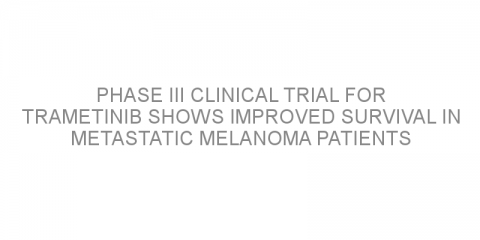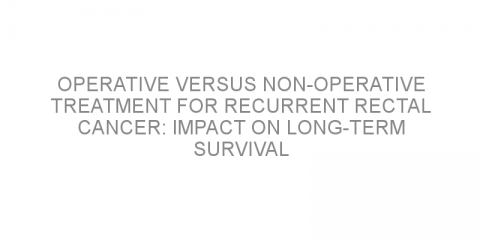In a nutshell This article provides the results of a study investigating surgical removal of metastatic stage IV melanomas. Results showed that surgical removal of metastatic melanomas can provide an increased survival time compared to systemic treatment alone. Some background Cutaneous melanoma which spread to other organs of the body (stage IV)...
Read MoreTreatment(s) now being considered-Chemotherapy Posts on Medivizor
Phase III clinical trial for Trametinib shows improved survival in metastatic melanoma patients with BRAF mutations
In a nutshell This study presents the results of a phase III clinical trial evaluating the efficacy and safety of the drug trametinib for the treatment of metastatic melanoma patients with BRAF mutations. Some background BRAF is a protein from a chain of proteins in the cell called the MAP kinase pathway. These play a role in cell division and...
Read MorePhase I and II clinical trial evaluating the combination of dabrafenib and trametinib for the treatment of patients with metastatic melanoma
In a nutshell This paper presents results from phase I and II clinical trials evaluating the safety and efficacy of two targeted therapies – dabrafenib and trametinib – given in combination for metastatic melanoma patients with BRAF mutations. Some background BRAF is a protein that plays a role in cell division and growth. About 50% of...
Read MoreRisk of Heart Failure after Anthracycline (Adriamycin/Daunomycin) and Trastuzumab (Herceptin) Treatments for Breast Cancer
In a nutshell This study evaluated the risk of heart disease associated with two commonly prescribed treatments for breast cancer. The main finding was that Trastuzumab (Herceptin) and Anthracycline (Adriamycin/Daunomycin) treatments are associated with a higher risk of heart failure or ‘cardiomyopathy’. Some background Anthracyclines...
Read MoreXELIRI-bevacizumab versus FOLFIRI-bevacizumab as primary treatment for patients with metastatic colorectal cancer
In a nutshell The present clinical trial compared two chemotherapy regimens as first-line treatment for patients with metastatic colorectal cancer (mCRC): XELIRI-bevacizumav versus FOLFIRI-bevacizumab. Some background Approximately one quarter of patients with colorectal cancer (cancer in the large intestine) have metastases,...
Read MorePreoperative Magnetic Resonance Imaging can predict good outcomes for rectal cancer patients treated with surgery alone
In a nutshell The present study examined the survival rate of rectal cancer (RC) patients treated with surgery alone, based on preoperative Magnetic Resonance Imaging (MRI) staging predictive of a good prognosis. Some background RC is staged according to how far the cancer has spread through the walls of the rectum (the final section of...
Read MoreTreating recurrent rectal caner that invades the pelvic area: major surgical options
In a nutshell This article reviewed several clinical studies where radical surgical procedures have been used to treat rectal cancer that has invaded the area of the pelvis. Some background The sacrum bone is the lowest part of the spine which sits between the hip bones. It is made up of 5 vertebrae which are separate bones during...
Read MoreOperative versus non-operative treatment for recurrent rectal cancer: impact on long-term survival
In a nutshell The present paper compares long-term survival rates of surgery versus non-operative treatments in patients with recurrent rectal cancer (RRC). Some background Rectal cancer is cancer in the final section of the large intestine, or rectum. Surgery to remove the cancer is the first choice of treatment, but chemotherapy with or...
Read MoreBosutinib: a new drug that increases progression free survival in patients with locally advanced or metastatic breast cancer
In a nutshell This paper presents the results of a clinical study which looked at the use of a new drug called Bosutinib (Bosulif) for the treatment of breast cancers diagnosed as being stage III or IV. In patients previously treated with chemotherapy, Bosutinib showed promising efficacy in delaying cancer progression. Some background Locally...
Read MorePhase I trial to determine the safety of a new anti-cancer drug: PD 0332991
In a nutshell This article presents the results from the first human trial of PD 0332991, a new anti-cancer drug. The main objective of the study was to determine the safety and recommended dose for further testing. Results warrant further studies and revealed that neutropenia (low white cell count) was the main side effect. Some background Cells...
Read MoreEribulin (Halaven) versus other treatment options in women with stage IV breast cancer
In a nutshell This study compared the efficacy of Eribulin (Halaven) versus other treatments in women with previously treated stage IV breast cancer. Eribulin extended overall survival more than the other treatment options. Some background Late stage breast cancer offers limited treatment options. At this point in the disease,...
Read MoreRegorafenib is a new drug for the treatment of metastatic colorectal cancer after failure of previous therapies
In a nutshell The present study evaluated the efficacy of a new drug, Regorafenib, for the treatment of refractory (progressing despite several lines of treatment) metastatic colorectal cancer (mCRC). Some background Many of the patients with colorectal cancer do not present any symptoms in the early stages of the disease so the cancer...
Read More











